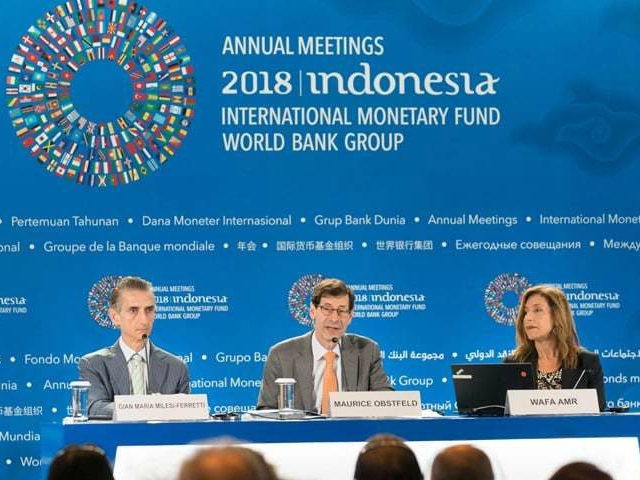The chief economist at the International Monetary Fund (IMF) cautioned Pakistan this week against “excessive loans” from its ally, China, citing risks.
Maurice Obstfeld’s warning came as Islamabad is seeking to turn to the IMF for a second bailout program in five years.
During a news conference at the IMF and World Bank annual meetings in Bali, the IMF official noted that if the international banking body does grant emergency financial assistance to Pakistan, the goal would be reforms that would help Islamabad reach its “immense potential” without providing specific details, Reuters reported.
“The government has expressed its desires to enact deep structural reforms that might break the cycle of Pakistan needing financial support from the Fund,” Obstfeld declared.
While acknowledging that Pakistan is facing large fiscal and current account deficit, Obstfeld warned that Beijing’s involvement in Islamabad’s economy could bring both benefits and risks.
“It is important that the design of the projects … be solid and excessive debts which cannot be repaid are avoided,” the IMF chief economist proclaimed.
On Monday, Pakistani Finance Minister Asad Umar revealed that Islamabad began negotiations with the IMF for an emergency financial aid package, marking the thirteenth time Islamabad is asking for such a loan, according to Firstpost, which described the Muslim nation’s dire financial straits:
All indicators suggest a downturn in economic growth and increase in inflation. The forecast for growth is between 4.8 percent and 5.1 percent, with inflation in double digits. It took seven meetings of the nation’s highest economic affairs body to finally increase fuel prices by an astronomical sum, the largest single rise in years.
…
Given the seriousness of the economic situation, a potential meltdown in Pakistan could have a catastrophic effect on its population (around 210 million), with the impact being felt all over South Asia. With the radical Islamist waywardness persisting despite operations by Pakistan’s security forces, there can be no predicting the direction this may take. What will worry the international community is the inevitable issue of the security of Pakistan’s strategic nuclear assets. Although Pakistan is yet far from that stage, doubts about the effective control by the government remain.
Austerity measures imposed by Pakistan’s recently elected Prime Minister Imran Khan as an alternative to a second bailout program from the IMF have seemingly failed.
Pakistan needs $10 billion from the IMF to remain above water, Firstpost noted.
Citing concerns about Pakistan’s debt levels, the Khan administration slashed Beijing’s ambitious multi-billion dollar project — the China-Pakistan Economic Corridor (CPEC) component of the One Belt One Road (OBOR) initiative – by $2 billion.
Some economists consider CPEC to be the primary culprit behind Pakistan’s economic problems, Firstpost noted.
“The changes are part of Islamabad’s efforts to rethink key Belt and Road Initiative projects in Pakistan, to which China has pledged about $60bn in financing,” Reuters explained.
U.S. President Donald Trump’s administration has accused China of “predatory lending” practices through its OBOR project, also known as Belt and Road Initiative (BRI).
In July, U.S. Secretary of State Mike Pompeo noted that there was “no rationale” for the IMF to provide Pakistan with a bailout to pay off Chinese loans. The United States is a major IMF shareholder.
China has dismissed U.S. criticism, saying OBOR will boost economic growth and create jobs in Pakistan.

COMMENTS
Please let us know if you're having issues with commenting.